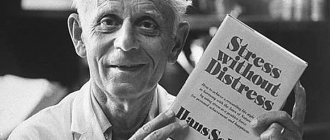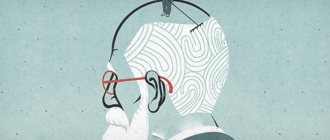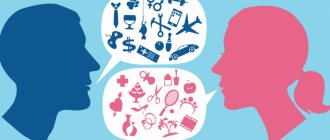Emotional stress is a phenomenon provoked by strong negative emotions, requiring one to leave the comfort zone and forcing one to adapt to the emerging conditions. Simply put, this is a powerful emotional shock generated by conflict situations that continuously and severely limit the satisfaction of needs. The existence of modern man is associated with constant stress. Living conditions, overwork, dissatisfaction with the social role, professional sphere - everything gives rise to emotions. Sometimes people have to suddenly “emerge” from the zone of emotional balance, which leads to the need for psychological adaptation. This is how emotional stress arises.
Types of stress
The causal factor (stressor) can be positive or negative. In this regard, it is customary to divide stress into 2 types:
- Eustress. This type of stress is a safe form and has predominantly positive properties. This is a state of joyful excitement, mobilization (collection) of the body. A person experiences emotions that are the impetus for action. This state is sometimes called the awakening reaction.
- Distress. This species has the opposite nature to eustress. The condition is a consequence of critical overstrain, sometimes leading to psychological disorder. This is a harmful form of stress that causes a number of negative processes in the body and provokes the development of disorders in various systems and organs.
Types of stress are characterized by different mechanisms, but in both cases they affect a person’s physical and psychological well-being. According to the nature of origin, there is the following classification of stress:
- Physiological. Characterized by the negative influence of external factors on the body. These include heat or cold, hunger and thirst, the effects of chemicals, exposure to viruses and bacteria, physical stress, injury, surgery, etc.
- Emotional and psychological. Often arise as a result of unfavorable relationships with society. Develop under the influence of positive or negative factors. For example, due to a salary increase/decrease or illness of a loved one.
- Nervous. Occurs when there is excessive overvoltage. The development of this form depends on the characteristics of the human nervous system and the ability to cope with changing circumstances.
- Chronic. This form is dangerous. A person loses the ability to control his emotional state, being constantly in tension even in the absence of negative factors. Depression and a nervous breakdown develop.
Signs
Strength reserves for overcoming stress vary from person to person. They are called stress resistance. Hence, stress, which is a risk factor that threatens health, must be considered according to its manifestations affecting the psycho-emotional state. Distress (characterized by prolonged exposure to stress factors and negative effects on the body) causes a failure of adaptive functions. When stressful conditions arise, an individual may experience fear, as a result of which he will act disorganized and experience difficulties with intellectual activity. Manifestations of stress are determined by the degree of stress resistance. Exposure to stressors causes psycho-emotional, behavioral and physiological transformations.
The most dangerous are physiological manifestations that threaten the adequate functioning of the body. Being under emotional stress, a person often loses his appetite, suffers from insomnia, and may experience allergic reactions, digestive disorders, hyperhidrosis, and headaches.
Emotional signs of stress are found in changes in emotional mood. It is easier to get rid of them than other manifestations, since they are controlled by the will and desire of the individual. Due to the impact of negative emotions and socio-biological factors, manifestations such as bad mood, despondency, depressive mood, restlessness, anxiety, aggressiveness, feelings of loneliness, and anger may occur. The listed emotions arise suddenly and are characterized by intensity. Transformations in character are also observed: decreased self-esteem, increased introversion.
It is impossible to experience extreme stress without an emotional response. It is emotional reactions that determine the state of an individual.
Behavioral signs manifest themselves in decreased performance, speech changes, loss of interest in professional activities, and difficulties in communicative interaction. Emotional stress, expressed by behavioral changes, is easily determined by prolonged communication with and observation of the individual. A person under stress is characterized by impulsiveness, rapid and unintelligible speech, and committing rash acts.
Psychological signs of emotional stress most often arise and are detected during a long-term stay outside the comfort zone with an inability to adapt to the conditions that arise. As a result, memory impairment, concentration problems, and sexual behavior disorders occur. The person feels helpless, alienated from loved ones, and plunges into a depressive state.
Causes of stress
Any factor can cause stress. Psychologists have divided the causes of stress into the following groups:
- Family. Strained relationships between family members often cause psychological stress.
- Personal connections. The emotional state may be disrupted when interacting with friends, colleagues, neighbors and strangers.
- Self-expression. The lack of opportunity for self-realization is perceived by most people as a betrayal of oneself; it disrupts psychological balance.
- Finance. Financial situation and financial issues are the most important factors that disrupt the emotional balance in a person’s life.
- Health and safety. The discovery of a dangerous disease, injury, threat to life and health causes a strong emotional reaction in a person.
- Job. It is a source of stressful situations for most people.
- Personal problems. Losing control over one's life and events causes distress.
- Death of a loved one. It is a fairly strong impetus for the occurrence of stress reactions.
Causal factors are divided into 2 general groups: personal and organizational. They are also divided into external (due to the presence of a stimulus in the environment) and internal (associated with the internal environment).
The psychology of stress is determined by a person’s personal attitude to what is happening, his perception of the situation.
The concept of stress and stages of its development
The concept of emotional stress was first identified by the physiologist Hans Selye in 1936. This concept denoted reactions unusual for the body in response to any adverse impact. Due to the influence of stimuli (stressors), the body's adaptation mechanisms are in tension. The adaptation process itself has three main stages of development - anxiety, resistance and exhaustion.
In the first stage of the response phase (anxiety), the body's resources are mobilized. The second, resistance, manifests itself in the form of activation of defense mechanisms. Exhaustion occurs when psycho-emotional resources are exhausted (the body gives up). It should be noted that emotions and emotional stress are interrelated concepts. But only negative emotions that cause negative stress can lead to serious mental disorders. Selye called this state distress.
Causes of distress prompt the body to exhaust its energy. This can lead to serious illness.
The concept of stress can have a different character. Some scientists are confident that the manifestation of emotional stress is associated with a generalized distribution of sympathetic and parasympathetic arousals. And the diseases that appear as a result of this distribution are individual.
Distress - negative stress
Negative emotions and stress are unpredictable. The manifestation of the body’s protective functions against an emerging psychological threat can only overcome minor difficulties. And, with prolonged or periodic repetition of stressful situations, emotional arousal becomes chronic. A process such as exhaustion, emotional burnout, manifests itself precisely when a person remains in a negative psycho-emotional background for a long time.
Symptoms and signs of stress
A person in a state of emotional overload experiences 3 stages. They are characterized by the following:
- Feeling of anxiety, readiness to resist the effects of a stressor. The body mobilizes, breathing quickens, blood pressure rises, muscles tense.
- Providing resistance, adapting the body.
- When the resistance energy decreases, exhaustion occurs.
The manifestations of this condition vary from person to person. Main signs of stress:
- nervous excitability;
- increased irritability;
- emotional decline;
- high blood pressure;
- lack of concentration and attention;
- memory impairment;
- sleep disorder;
- indifference, pessimism;
- difficulty breathing;
- lower back pain;
- dyspeptic disorders (disorders of the digestive system);
- change in appetite;
- dilated pupils;
- fast fatiguability;
- headache.
There are also features of manifestation in representatives of different sexes.
Among women
It is easier to identify signs of emotional distress in women because... It is unusual for women to hide their feelings.
Women are more susceptible to stress factors due to the characteristics of their emotional organization.
In addition to general manifestations, when women are exposed to a stressor, their weight may change and their libido may decrease. Often, after prolonged stress, the menstrual cycle is disrupted.
In men
Men are generally considered to be more stress-resistant than women. Men react less emotionally to negative factors.
Male representatives are more restrained, which is fraught with danger: strong emotions remain inside a person and this increases internal tension.
A man in a state of distress may become aggressive. The consequence of overexertion is erectile dysfunction and decreased libido. The critical perception of what is happening often changes.
Signs of Emotional Stress
It is quite simple to understand that a person is under stress; the following signs will indicate this:
- apathy;
- anxiety in the absence of apparent reasons;
- irritability;
- inadequate perception of unpleasant situations;
- depression;
- yearning;
- depressed state;
- constant feeling of fatigue;
- change in appetite;
- sleep disorders;
- decreased concentration, memory, attention;
- decreased performance;
- lack of pleasure from doing what you love;
- “withdrawal” with a significant limitation of the circle of friends;
- low self-esteem;
- uncontrolled actions performed “automatically”: putting a mug of hot tea in the refrigerator, not taking change from the store, or brushing your teeth without toothpaste or powder;
- capriciousness.
Often, in order to weaken negative factors, people begin to resort to alcohol or drugs, trying to get away from problems in this way. Naturally, this approach is wrong.
You can also note some physiological signs:
- rapid breathing, shortness of breath;
- headache;
- exacerbation of allergies;
- increased heart rate, up to the appearance of tachycardia;
- Individual muscle groups tense, which leads to spasms even in the absence of stress.
In some cases, sudden changes in body temperature may occur.
Behavior under stress
In a stressful situation, human behavior has individual characteristics. It can be unpredictable for others. There are lines of behavior under stress, among which you can observe:
- Ignoring. The person pretends that nothing is happening.
- Solution to the problem. The individual rationally analyzes the situation in search of a way out.
- Seeking outside support.
There are 2 main human reactions to a difficult situation. In the first case, the individual evaluates the stress factor to determine subsequent actions; in the second, emotions predominate and no attempts are made to solve the problem.
One person's style of dealing with stress at work and at home may differ.
How stress is formed
When stressed, the nervous, hormonal and cardiovascular systems are simultaneously involved. Stress is a difficult test for the body and it negatively affects health (immunity drops, chronic diseases appear, and depression develops).
At the physical level, the effects of stress are as follows. After the impact of psychotraumatic factors on the human psyche, the strength of which exceeds the internal resources available to the body (the so-called stress resistance), the following reactions begin to develop:
- the adrenal cortex produces cortisol;
- their inner layer releases 2 hormones norepinephrine and adrenaline into the blood;
- damage occurs to the mucous membranes of the stomach, as well as the duodenum, and ulcers appear on them;
- glucose levels increase, and this leads to a decrease in tissue sensitivity to insulin, which, in turn, causes the development of type 2 diabetes;
- there is a retention of sodium, and, accordingly, fluid in the tissues, and potassium, which is needed for the normal functioning of nervous and cardiac tissue, on the contrary, is excreted faster;
- the cells in which glucose is formed disintegrate;
- the lipid content in the tissue that makes up the subcutaneous tissue increases;
- the rhythm and frequency of the heartbeat is disrupted;
- pressure rises.
As a result of such disorders caused by stress, human health suffers, immunity decreases, and various disorders develop in the functionality of internal organs. These are the negative consequences of powerful stress, which does not go unnoticed by the body.
What determines susceptibility to stress?
The attitude towards an event or news will differ from person to person. Therefore, for one person the situation will cause emotional shock, and for another only annoyance. Those. receptivity depends on the meaning a person attaches to what is happening. Temperament, the health of the nervous system, upbringing, life experience, and moral assessments are of great importance.
People with an unbalanced character and/or suspicious (subject to fears, doubts) people are less resistant to stressors.
A person is especially susceptible to changing conditions during periods of overwork and illness.
Recent research by scientists has shown that it is more difficult to anger people with low levels of cortisol (the stress hormone). They do not lose their composure in stressful situations.
Stages of stress
Stress is considered to go through 3 stages. The speed of their development and change depends on the force with which stress acts on the mental sphere of a person and in what state it is in. Stages include:
- Anxious stage. When it occurs, a person cannot control his thoughts and actions, his behavior changes in the opposite direction and becomes extremely different from what it was before.
- Resistant stage. At this stage, the body’s vital resources accumulate and are mobilized to combat stress. This is necessary so that a person can find the right solution and take the necessary measures to get out of the current situation.
- Exhaustion stage. This stage replaces the previous one and develops as a result of prolonged stress, due to the fact that the body is no longer able to withstand the load. It is at this stage that damage to the visceral organs occurs.
According to a more modern classification, there are 4 stages of stress:
- Mobilization or strengthening of human attention and motor activity. At this stage, a person’s internal forces are spent carefully, and if the process stops during this period, then stress does not damage the body, but strengthens it.
- The emergence of strong negative emotions: rage, anger and aggression, which the body needs in order to achieve its goal.
- The emergence of negative emotions of the passive type . They arise due to the wasteful expenditure of energy by the body at the previous stage, which greatly depletes the body. The person becomes apathetic and no longer relies on his own strength to get out of the current situation. Depression may result from a pessimistic mood.
- The last stage is absolute demoralization. This stage occurs when the stress factor affects the human psyche constantly and does not reduce its intensity. The patient comes to terms with the fact that nothing can be done, becomes indifferent and does not want to solve any problems. May refuse treatment.
The last stage can last a long time and cause a complete decline in the psycho-physical capabilities of the body.
Ways to respond to stress
A stressor causes a complex of emotional manifestations. Psychologists have identified the following types of response:
- "Ox Stress" This type of reaction involves being at the limit of psychological, mental or physical abilities. An individual can live in a familiar rhythm for a long time, being in a traumatic situation.
- "Lion Stress" A person violently shows emotions and reacts expressively to events.
- "Bunny Stress" Characterized by attempts to hide from problems, lack of activation. The person experiences the situation passively.
The reaction to a stress factor can be immediate or expressed in protracted experiences.
Phases of stress
The development of stress occurs in three phases:
- Mobilization. The body reacts to a stressor with anxiety and mobilizes its defenses and resources to withstand the stress factor.
- Confrontation. The body resists a stressful situation, the person actively seeks a way out of it.
- Exhaustion. With a long duration of influence of a stress factor on a person, the body begins to deplete and becomes vulnerable to secondary threats (various diseases).
Diagnostics
Even with clear symptoms of stress, a person may deny its presence. Diagnosis of the condition is carried out by a psychiatrist, psychotherapist or psychologist. A detailed conversation is held with the patient, complaints are clarified. For accurate diagnosis, questionnaires are used:
- To determine your own assessment of stress resistance, a specially designed test is carried out. Express diagnostics of emotional and psychological stress is used. The patient is tested on the Lemoore-Tessier-Fillion Psychological Stress Scale, the Spielberger-Hanin State Anxiety Scale, and the Zung Self-Rating Anxiety Scale. The nature of the adaptation syndrome is determined.
- The Clinical Complaints Scale is used to assess the consequences of stress and negative changes in the body. Questionnaires are used to determine suicidal tendencies and depression. Tests in this group are designed to detect predisposition to neurotic disorders and determine stress resistance.
Bookstores offer a large number of publications containing various tests for self-analysis. However, psychologists recommend seeking professional help if you suspect a stressful condition, since self-diagnosis is not objective.
Major stressors
Psychologists identify eight of the most common causes of stress arousal:
- Personal connections. Relationships with friends, family, colleagues at work, or even complete strangers often generate stress, as they are always accompanied by emotional states.
- Finance. Many psychologists believe that financial relationships are the main and main cause of stress.
- Opportunity for self-expression. Many people try to express themselves, but not everyone succeeds in doing this.
- Family. For any person, tense and strained relationships with any of their relatives can become one of the main causes of psychological stress, and in the future will lead to stress.
- Own problems. A person always wants to control his own life, and some try to have control over someone else’s. When such control weakens, you become stressed because the person wants to control everything.
- Safety and Health. Such problems are often perceived very painfully by us, since they really pose a threat to your life.
- Job. It, like finances, is directly related to sources of stress. For some, being busy is an absolute priority.
- Death. For every person, the death of a beloved pet is a huge stress, not to mention the loss of a loved one, which often leads to psychological disorders. The source of such a state can also be the anticipation of death itself.
The cause of psychological stress can be anything. Both men and women are susceptible to depression and stress. Each has its own characteristic features. If you notice signs of stress in yourself or someone else, you should first find out the reasons for this condition. Because eliminating the consequences of stress overexertion is much more difficult than simply eliminating its causes.
Treatment of stress
When symptoms are detected, it is important to determine the causative factor, and after it is eliminated, the psycho-emotional state returns to normal. In the chronic form, long-term treatment (from several months to a year) is necessary, aimed at adapting to the current situation.
Psychotherapeutic methods for overcoming stress
Psychotherapy can be carried out in the following main areas:
- Gestalt therapy;
- cognitive behavioral psychotherapy;
- psychoanalysis;
- body-oriented psychotherapy;
- transaction analysis.
The doctor works with a person’s perception and destructive beliefs. Life values and goals are adjusted, and the skills of self-control and self-acceptance are trained.
How to overcome stress on your own?
Psycho-emotional stress is expressed by muscle hypertonicity and changes in breathing rhythm. To relieve stress, breathing exercises, physical exercises, and massage are recommended. Procedures should bring pleasure and distract from problems.
When exposed to a stressor, psychologists recommend the following techniques:
- breathe slowly;
- cry;
- wash with cool water;
- drink tea or water;
- change the situation;
- mentally count;
- speak out to yourself or someone else;
- change the type of activity.
The concept of “relaxing under stress” has nothing to do with drinking alcohol or smoking. Bad habits will cause even more health problems and make the situation worse.
Drug treatment of stress conditions
If necessary, after diagnosing the patient’s condition, the doctor selects medications. The choice of medications depends on the prevailing symptoms. In different cases, antidepressants, tranquilizers, antipsychotics, and sedative herbs are prescribed.
Symptoms of stress
Symptoms of acute stress appear only a short time after the stressful situation occurs. These are symptoms such as confusion, disorientation in current events. Due to these severe conditions, a person may do unusual and stupid things that will seem too inadequate to outside observers.
Delusional ideas and self-talk are another symptom of acute stress. But it does not last long and ends as abruptly as it began. A person under acute stress may not understand what is being said to him. He may fall into a stupor and not be ready to fulfill even the simplest request or do it incorrectly.
Retardation in speech and movement are also symptoms of acute stress. This condition can be so severe that the patient simply freezes in the same position and hardly reacts. Sometimes the opposite reaction is possible: a person becomes fussy and talks a lot. He may feel the urge to harm himself or run away.
Symptoms of acute stress can also be reddened or pale skin, dilated pupils, nausea, vomiting, diarrhea, and a sharp drop in blood pressure . If the symptoms described above persist for more than 1-2 days, then you should urgently see a doctor to determine the real cause of stress and prescribe appropriate treatment.
Even after the acute stress has passed, tension and memories of it can still bother a person for some time. His sleep and appetite may be disturbed, and the desire to do anything may disappear for a long time. He can live and work, as they say, “automatically.”
Techniques for increasing stress resistance
Various techniques are used to train stress resistance.
Psychologists give the following recommendations:
- Learn not to worry about factors that have nothing to do with a person’s behavior.
- Do not invent problems, do not allow negative emotions to develop ahead of time. The problem must be solved when it occurs.
- You need to be able to honestly acknowledge your own emotions, rather than deny them.
- Never blow things out of proportion. Exacerbating circumstances will only worsen the condition.
- Every person is capable of changing his attitude towards surrounding events. You need to learn to look at the world around you positively.
- When an unpleasant situation arises, it is useful to mentally imagine an even worse state of affairs. After this, the understanding often comes that not everything is so bad.
You need to be able to relax, you should find time for sports, leisure with loved ones, conduct autogenic training (self-hypnosis method, you can attend psychological training or do exercises on your own).
In some cases, a complete lifestyle change helps.
Symptoms
When we are faced with such unusually difficult, and what is important – long-term situations, a reaction adequate to fatigue and stress arises. Yes, from the outside it will seem that you are not yourself. Well, the circumstances are atypical. Ignoring the body's signals (headache, hand tremors, the desire to send the boss with her quarterly report) - all this results in tangible symptoms of stress:
- difficulty remembering;
- it becomes difficult to concentrate on anything;
- anxiety and internal tension arise;
- emotional instability - you want to cry, or kill things, or an incomprehensible laugh breaks out;
- obsessive thoughts of alarming and negative content appear;
- it seems that everyone around is watching, discussing behind their back;
- constant drowsiness, which is replaced by insomnia;
- it is impossible to calm down and relax;
- irritability appears;
- the general condition resembles depression, apathy;
- is not able to take care of oneself normally (eat, rest);
- isolation and escape into loneliness;
- Chronic diseases and psychosomatics are getting worse;
- bad habits appear (alcohol, smoking, nail biting);
- anxiety borders on guilt;
- immunity decreases.
Emotional symptoms
A person begins to experience feelings of loneliness and fatigue, demonstrating to others his capriciousness and irritability. It becomes impossible to relax and calm down.
How to recover from stress
Having studied in detail all the stages of stress, Hans Selye believed that the best way to recover from emotional shock and general immersion in grief was to turn to memories of past victories and successes that happened throughout life. Bright pictures that carry a positive charge will help restore faith in the best and relieve the burden of experiences.
If stress has become a turning point in a person's life, he may require qualified medical assistance. When a patient who agrees to medical intervention has at least one meeting with a psychotherapist who manages to win over a person with a traumatized psyche, the emotional conversation alone will already produce results.
Causes and therapy
Stages of conflict - a brief description of the main stages in psychology
The importance of stress in everyone’s life is difficult to overestimate – it inevitably leaves a scar on your mental or physical health. The cause, or stressor, can be either negative information or positive information, which carries a large emotional load on the object.
G. Selye gave in his book a vivid example of a situation in which positive information, becoming a stressor, can kill a person if he received it at a time when his irreplaceable supply of adaptive energy has dried up. As an object, he proposes to consider a woman who saw off her only son to war. Having received the tragic news that he died in battle, the mother spends a huge amount of energy, first on anxiety associated with the pain of loss, then on struggling with heartbreaking feelings. She lives for many more years, keeping the memory of her son alive. But, if after a certain number of years it turns out that the funeral came to her by mistake, her child is alive, and one day he opens the door and enters the house, the woman may lose consciousness from stress, already based on positive emotions. A strong shock, catching her at an advanced age, can provoke a heart attack and, as a result, death. An exhausted body will not find the strength to adapt, in which case the stage of exhaustion will begin.
The body itself at the cellular level is also capable of experiencing stress. On a daily basis, a person may encounter a stage of anxiety when, for example, he is forced to be outside in extremely low temperatures. The first stage of the muscle is met with tone and trembling, after which the body constricts, as a result of which the vessels of the extremities narrow, the skin significantly reduces heat loss, and the vital organs maintain the desired temperature and are provided with the necessary volume of oxygen due to active blood circulation. This, like the second phase of stress development, is a vivid example of resistance.
Exposure to low temperatures
Attention! If you know exactly at what stage stress begins, you can take timely measures to prevent its development in order to preserve adaptive energy.
Therapy that begins at the first stage of development will be the most effective, even if it is limited to the proper organization of leisure time, than heavy drug assistance, after the resistance phase mechanism has been launched.
Relaxation is the main direction that psychologists recommend starting with for those who are experiencing the first stage of stress. It is important to get rid of muscle tone if it occurs as a result of nervous strain. In this case, a professional massage therapist will help. In the complex, you should not neglect a change of scenery. However, G. Selye argued that in almost all cases occupational therapy can help cope with even the most severe stress. When a person manages to become useful and engage in creative activities, he switches from the confusion syndrome and concentrates on business, saving even his soul from a serious illness.
Distress and eustress
The stages of stress do not always characterize only a negative state in psychology. If a person experiences symptoms of exhaustion, followed by other negative and sometimes dangerous conditions for the body, then we are talking about distress.
In this case, the psychological and physiological balance is disrupted. This condition can last for several hours or days, but sometimes it becomes chronic. The person may then suffer from distress for years.
Eustress is characterized by a surge of joyful emotions, which, on the contrary, improve a person’s mood. Typically, this condition occurs when a person is well aware of problems, but concentrates on a positive outcome. To a weak degree, eustress is even beneficial for the body. This is the so-called drive response.
If eustress is too active, this can also lead to overload in the body. Although this stage usually does not progress to the chronic stage.
The stages of stress have been repeatedly considered in physiology and psychology. These two sciences are inseparable and allow us to much better understand the behavior and reactions of people to certain stimuli or events. Scientists continue to work on the theories of Selye and other authors, so gradually the stages of stress are adapted to the modern world and their concepts are expanded.










